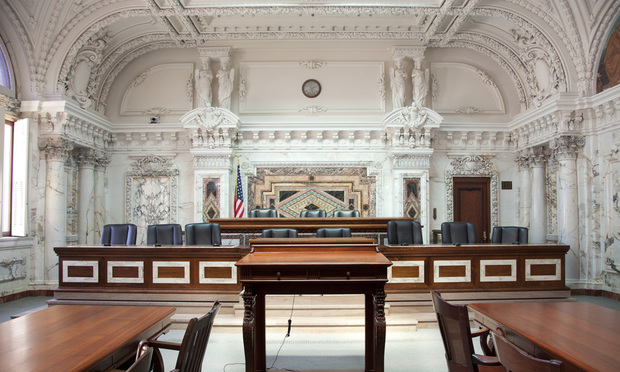The Ghost in the Room: Mediation and the Courts
The management of burgeoning civil dockets, budgets, courtroom facilities, scheduling pressures and the occasional good old-fashioned desire to punt on complex dispositive motions, have all played a part in causing courts to claim a vested interest in both mediations and their outcome.
September 17, 2018 at 01:00 PM
7 minute read
 U.S. Court of Appeals for the Ninth Circuit, San Francisco (Photo: Jason Doiy/ALM)
U.S. Court of Appeals for the Ninth Circuit, San Francisco (Photo: Jason Doiy/ALM)
At the heart of it, civil mediation represents a voluntary effort on the part of private disputing parties to be fully and finally left alone: alone to identify and evaluate their respective positions and needs; alone to negotiate on their own terms; and, in the end, alone to craft and effect their own resolution. So why is it that these private mediating parties often have an acute sense that there is another actor haunting their mediation?
It's the court—sometimes even when the dispute being mediated is not in suit.
Counsel can attend timely and adequately to this haunting mediation presence so that, to the greatest degree possible, they can secure for their clients the unfettered space necessary for mediation efforts to be effective.
The Court's Skin in the Game
If you've practiced long enough, you likely recall a time when the type of “alternative dispute resolution” known as mediation appeared to be more truly alternative than it often does today.
Perhaps inevitably, courts over time have asserted their own status as at least virtual stakeholders in the mediation process. The management of burgeoning civil dockets, budgets, courtroom facilities, scheduling pressures and the occasional good old-fashioned desire to punt on complex dispositive motions, have all played a part in causing courts to claim a vested interest in both mediations and their outcomes. Who among us has not heard, with at least some sympathy, a version of the plea for mediation delivered by Special Master Ralph Lancaster to the parties in the Georgia/Florida ”water wars” litigation, as reported by the Associated Press: “Please settle this blasted thing. I can guarantee you that at least one of you is going to be unhappy with my recommendation—and perhaps both of you.”
Confidentiality and/or Privilege:
A fair argument can be advanced that the “special sauce” at the core of the mediation process is confidentiality. Without all parties' confidential access to the mediator, and without the transparency underwritten by the confidentiality of the everything exchanged by the parties in mediation, mediation would be reduced to the low-value shuttle diplomacy scheme many cynics suspect it is.
In jurisdictions where no Uniform Mediation Act or other mediation privileges have been legislatively adopted, mediation confidentiality can be a perilous proposition. Mediation agreements routinely include mutual agreements as to confidentiality, but, without a mediation privilege, courts have taken a variety of positions regarding mediation confidentiality. Some find that parties cannot enter enforceable agreements as to confidentiality. Some confuse confidentiality and privilege. Some eschew contract and privilege arguments in favor of evidentiary exclusion analysis.
Because confidentiality is key in mediation, parties and their counsel should give close attention to which courts may be asked to rule on mediation confidentiality and the analysis those courts may apply.
Dispositive and Practically Dispositive Motions
Very often in the mediation of disputes that are in suit, there is a summary judgment, Daubert or other practically dispositive motion that is either the subject of mature contemplation, fully briefed, filed or argued with a ruling pending. Should mediation be postponed until a ruling is secured? Should we ask the court to rule so that we can negotiate or negotiate before a ruling is entered? These are all sound tactical questions, and any good mediation advocate knows one size does definitely does not fit all here.
Of the myriad considerations that may come into play, be sure to attend with care to two.
First, in evaluating how best to leverage such motions in mediation, do not make the mistake of focusing exclusively on the objective merits of the legal issues presented. Little good will it do you to blaze forth in mediation around the length, breadth and strength of your precedents, if you have failed to consider the court's track record in granting or denying such motions or, as importantly, in endlessly putting off ruling altogether.
Second, make every effort not to relinquish to the court control of the mediation process. Human nature being what it is, an announcement to the court that the parties are undertaking a mediation can have the effect of a valuable motion not being scheduled, not being taken seriously or not ruled upon, timely or otherwise. Obviously, situations will differ depending on a variety of factors, but, in order to serve its intended purpose, mediation should be by and about the parties and their interest in taking control of their dispute.
The Judge as Mediator
For understandable reasons, it is a conventional feature of case management for judges to occasionally undertake conferences with parties and counsel directed to inquiries about, and often strenuous encouragement for, settlement. However, with the advent of mediation, it is no longer unusual for courts to move beyond settlement conferences into what are frankly characterized as mediations. Indeed, there is at least one federal district in which the local rules dictate that the federal magistrate judge in charge of managing all aspects of the suit up to dispositive motion stage, is also expected to serve as the parties' mediator.
Consequently, it is imperative for parties with a dispute that is in suit to establish with the court a meaningful mutual understanding about the mediation process. There is a reason the typical Uniform Mediation Act details that it does not apply to judicial settlement conferences—they are not mediations. The candor minefield feature of judicial settlement conferences is quite distinct from the confidentiality, privilege and evidentiary exclusion features of a mediation. In order for the mediation process to work, the parties must have confidential and/or privileged access both to a neutral and to one another. It is difficult to discern how the court could entertain, ex parte, the types of communications requisite to meaningful mediation, much less keep track of confidential, privileged or inadmissible disclosures should the dispute move beyond mediation toward trial.
With due deference to the court, parties should insist at the outset of a dispute that is in suit on having with the court not only a mutually satisfactory understanding of the mediation process but an assurance that the parties have autonomy in mutually selecting an appropriate neutral to facilitate any mediation.
Settlement Approval (Wrongful Death/Minority/Disability/Class Claims)
Notwithstanding the parties' need for autonomy in controlling of their own disputes, courts have an entirely legitimate and statutorily mandated oversight and approval role in the resolution of disputes involving parties deemed to be operating at a disadvantage. Perhaps the most common of these disputes are those involving wrongful death and class claims.
When mediating this type of dispute, be sure to start with the end in mind. There are any number of creative and useful ways to structure a resolution that optimizes benefits for all parties. However, all will be for naught, along with the energy and sense of occasion that often permits complex disputes to reach resolution in a scheduled arbitration conference, if the parties fail to attend to the likelihood that the resolution will not achieve court approval.
The notes above are only a few of the most obvious of the variety of dynamics that exist between courts and parties interested in maintaining control of their disputes by participating in mediation. With preparation, vigilance and attention to the looming judicial presence in the room, mediation advocates can secure the space needed to allow their clients to take control of their disputes, and mediation can continue to be the true alternative it was originally intended to be.
 Steve McKinney, Miles Mediation, Atlanta.
Steve McKinney, Miles Mediation, Atlanta.Stephen McKinney is a mediator and arbitrator with a national practice. He is a neutral at Miles Mediation & Arbitration in Atlanta.
This content has been archived. It is available through our partners, LexisNexis® and Bloomberg Law.
To view this content, please continue to their sites.
Not a Lexis Subscriber?
Subscribe Now
Not a Bloomberg Law Subscriber?
Subscribe Now
NOT FOR REPRINT
© 2025 ALM Global, LLC, All Rights Reserved. Request academic re-use from www.copyright.com. All other uses, submit a request to [email protected]. For more information visit Asset & Logo Licensing.
You Might Like
View All
CFPB Proposes Rule to Regulate Data Brokers Selling Sensitive Information
5 minute read

Trending Stories
- 1Treasury GC Returns to Davis Polk to Co-Chair White-Collar Defense and Investigations Practice
- 2Decision of the Day: JFK to Paris Stowaway's Bail Revocation Explained
- 3Doug Emhoff, Husband of Former VP Harris, Lands at Willkie
- 4LexisNexis Announces Public Availability of Personalized AI Assistant Protégé
- 5Some Thoughts on What It Takes to Connect With Millennial Jurors
Who Got The Work
J. Brugh Lower of Gibbons has entered an appearance for industrial equipment supplier Devco Corporation in a pending trademark infringement lawsuit. The suit, accusing the defendant of selling knock-off Graco products, was filed Dec. 18 in New Jersey District Court by Rivkin Radler on behalf of Graco Inc. and Graco Minnesota. The case, assigned to U.S. District Judge Zahid N. Quraishi, is 3:24-cv-11294, Graco Inc. et al v. Devco Corporation.
Who Got The Work
Rebecca Maller-Stein and Kent A. Yalowitz of Arnold & Porter Kaye Scholer have entered their appearances for Hanaco Venture Capital and its executives, Lior Prosor and David Frankel, in a pending securities lawsuit. The action, filed on Dec. 24 in New York Southern District Court by Zell, Aron & Co. on behalf of Goldeneye Advisors, accuses the defendants of negligently and fraudulently managing the plaintiff's $1 million investment. The case, assigned to U.S. District Judge Vernon S. Broderick, is 1:24-cv-09918, Goldeneye Advisors, LLC v. Hanaco Venture Capital, Ltd. et al.
Who Got The Work
Attorneys from A&O Shearman has stepped in as defense counsel for Toronto-Dominion Bank and other defendants in a pending securities class action. The suit, filed Dec. 11 in New York Southern District Court by Bleichmar Fonti & Auld, accuses the defendants of concealing the bank's 'pervasive' deficiencies in regards to its compliance with the Bank Secrecy Act and the quality of its anti-money laundering controls. The case, assigned to U.S. District Judge Arun Subramanian, is 1:24-cv-09445, Gonzalez v. The Toronto-Dominion Bank et al.
Who Got The Work
Crown Castle International, a Pennsylvania company providing shared communications infrastructure, has turned to Luke D. Wolf of Gordon Rees Scully Mansukhani to fend off a pending breach-of-contract lawsuit. The court action, filed Nov. 25 in Michigan Eastern District Court by Hooper Hathaway PC on behalf of The Town Residences LLC, accuses Crown Castle of failing to transfer approximately $30,000 in utility payments from T-Mobile in breach of a roof-top lease and assignment agreement. The case, assigned to U.S. District Judge Susan K. Declercq, is 2:24-cv-13131, The Town Residences LLC v. T-Mobile US, Inc. et al.
Who Got The Work
Wilfred P. Coronato and Daniel M. Schwartz of McCarter & English have stepped in as defense counsel to Electrolux Home Products Inc. in a pending product liability lawsuit. The court action, filed Nov. 26 in New York Eastern District Court by Poulos Lopiccolo PC and Nagel Rice LLP on behalf of David Stern, alleges that the defendant's refrigerators’ drawers and shelving repeatedly break and fall apart within months after purchase. The case, assigned to U.S. District Judge Joan M. Azrack, is 2:24-cv-08204, Stern v. Electrolux Home Products, Inc.
Featured Firms
Law Offices of Gary Martin Hays & Associates, P.C.
(470) 294-1674
Law Offices of Mark E. Salomone
(857) 444-6468
Smith & Hassler
(713) 739-1250







